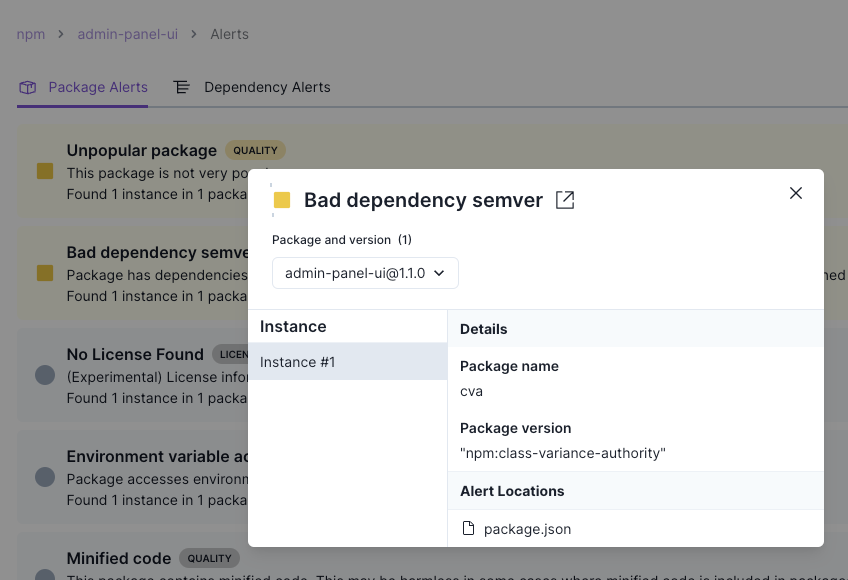Bad dependency semver
Severity
Medium
Short Description
Package has dependencies with an invalid semantic version. This could be a sign of beta, low quality, or unmaintained dependencies.
Suggestion
Switch to a version of the dependency with valid semver or override the dependency version if it is determined to be problematic.
Information
Semantic versioning (SemVer) is critical for managing dependencies across different versions of a package. A "bad" SemVer dependency may not adhere to proper versioning standards, leading to potential incompatibility issues with other libraries or breaking changes that weren't expected.
There are numerous risks when using a dependency with an invalid semantic version:
- Incompatibility: Improper versioning can lead to conflicts between dependencies. For example, a major change that’s not properly indicated could break functionality, as the system or other dependencies expect backward compatibility.
- Unreliable Updates: SemVer is designed to make updating dependencies predictable. A "bad" SemVer dependency may not signal the appropriate level of risk with an update (e.g., a breaking change in a patch update), leading to unpredictable and unstable behavior.
- Security Gaps: A bad SemVer dependency might skip critical security patches by not adhering to SemVer practices, leaving your project exposed to vulnerabilities.
- Difficulty in Debugging: When dependencies don’t follow SemVer standards, tracking down issues caused by version changes can become complicated, increasing the time and resources needed for debugging.
- Reproducibility Issues: Without proper version control, environments may become inconsistent across development, testing, and production, making it harder to reproduce bugs or ensure consistent behavior across setups.
These risks highlight the importance of adhering to proper semantic versioning practices to maintain stability, security, and predictability within software projects.
Recommended actions
Bad Dependency Semver is a medium-severity alert, and the default security policy has it set to Warn. Depending on the criticality of your project, you may want to remove or lock the dependency to a safe version to prevent unexpected or incompatible changes from disrupting your application.
- Investigate the Dependency: Check the specific package to determine if it is using proper semantic versioning. Review the release notes or changelog to understand what changes have been made and whether they are appropriately versioned.
- Pin Dependencies to Specific Versions: Temporarily pin your dependency to a known good version until the issue is resolved. This prevents unexpected breaking changes from affecting your project.
- Check for Updates: See if the package maintainers have issued a fix or a newer, properly versioned release. You may want to upgrade once a stable release is available.
- Report the Issue: If the issue persists, consider opening an issue or contacting the maintainers. They may not be aware of the improper versioning practices.
- Evaluate Alternatives: If the dependency is unreliable or has frequent bad SemVer practices, consider switching to an alternative package that follows proper versioning practices for greater stability.
Examples
Here's an example of a package flagged for having a dependency with invalid semantic versioning.

The specific dependency listed in package.json is linked in the alert:

Detection Method
Socket's Bad Dependency Semver alert detects packages that have an invalid semantic version, according to node-semver, the semver parser for node that npm uses. This alert is only applicable to the npm ecosystem.